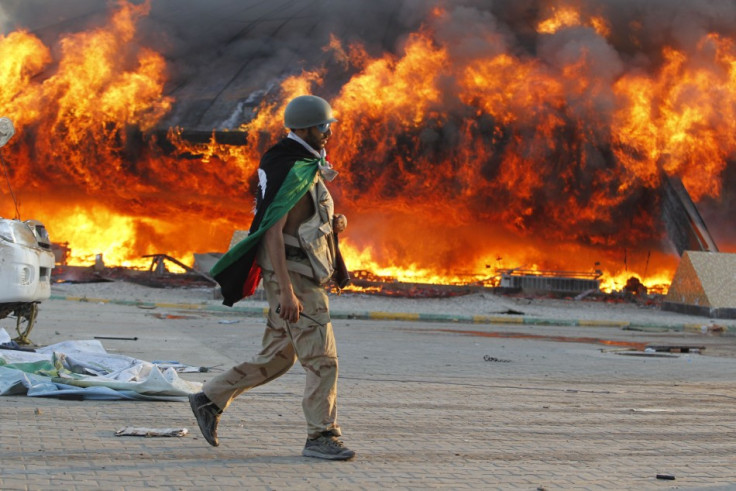Libya Conflict: As the Libyan Civil War Worsen, Are the Anti-NTC Forces Really ‘Gaddafi Loyalists’?

Despite Gaddafi being in hiding since the rebel assault on Tripoli, the National Transitional Council (NTC) forces are still struggling to take control of the country as latest report say that talks between the new regime and Gaddafi loyalists have broken down, leading many to fear a bloody battle for the town of Bani Walid.
While some of the reports say the tribal elders are refusing to surrender, others point out that they refused to allow armed men in the city, however with the NTC now insisting the time for talking is over, hopes for a peaceful end to the stand-off are diminishing.
Talking outside of the city, Abdullah Kenshil a negotiator for the NTC reportedly confirmed that talks with the tribal leaders are over, saying "It is the only thing that we don't want, any bloodshed in Bani Walid because we can kill you, kill with pistol or sniper or anything. They are nothing, you know, they are finished."
"As chief negotiator, I have nothing to offer right now. From my side, negotiations are finished," Abdallah Kanshil said outside Bani Walid.
However Kanshil seemed to contradict himself when he added "They said they don't want to talk, they are threatening everyone who moves. They are putting snipers on high rise buildings and inside olive groves, they have a big fire force. We compromised a lot at the last minute," he added.
Despite the council insisting it does not want to kill anymore Libyans and calling for Gaddafi loyalists to surrender, it seems that many are still struggling to accept the NTC.
With talks held privately and with only the NTC telling reporters how the negotiations advanced and then why they stalled, understanding the Libyan situation is becoming more and more complex. Surely, if the NTC is aware that the leaders of Bani Walid do not represent a serious military threat since as Kenshil said, "they are nothing", is a military assault necessary?
As the conflict turned to the advantage of the rebels with Tripoli now firmly under their control and the colonel in hiding, many the Gaddafi loyalists would surrender by now, but their determination to fight the NTC forces now raise questions.
Are the "Gaddafi forces" really fighting out of loyalty for their former leader?
In the case of Bani Walid for example, many warn that if the tribal elders have refused to surrender it is not in an act of support for Gaddafi but rather due to the failure to negotiate a role for them in the revolution.
Since the beginning of the conflict the NTC has monopolised the anti-Gaddafi struggle and a transitional cabinet was chosen, without discussing with the different tribes' representant or the people of Libya, which is now causing tensions.
Surely, tribal leaders outside of the Benghazi region will want to ensure they are represented in the new regime and as Bani Walid proves a failure to arrive to an agreement with the NTC, Libya could see factions of the population now taking up the arms againstthe new government. Gaddafi clearly ruled his country through patrimonialism, giving his internal allies positions within the government and its institution and the Warfalla tribe form Bani Wallid is an illustration of such tactics.
Since the former leader is now almost out of the picture, the Warfalla elders will seek to ensure their people are still benefiting from the same advantages with the revolutionary government.
Meanwhile, in Sirte, negotiations are still on-going, with NTC military spokesman Ahmed Bani saying in Benghazi "There are on-going negotiations regarding Sirte between the elders and various tribes and the free Libya forces surrounding Sirte." "The time is coming when talk is done with and we will enforce our will upon liberating the city of Sirte."
Meanwhile as details of the situation in Sirte, Bani Walid and Sabaha are maily coming from the NTC forces as communications appear to be cut off, the UN senior humanitarian official in Libya said he was worried about humanitarian problems in these territories "We are looking very closely at the situation in Sirte," said Panos Moumtzis, UN humanitarian coordinator for Libya.
"We are preoccupied about the protection of civilians in this area. We understand that there is a dialogue taking place. We would really like to see a peaceful solution as fast as possible."
A peaceful solution however does not seem to be on the cards as the Libyan civil war may be taking a turn for the worse, tearing the country further apart. As questions surrounding the motivations behind the Gaddafi "loyalists" are mounting, the NTC has to prove it wants to be inclusive by including various factions of the population in the aftermath of the revolution to provide for a fairer Libya.
© Copyright IBTimes 2025. All rights reserved.





















